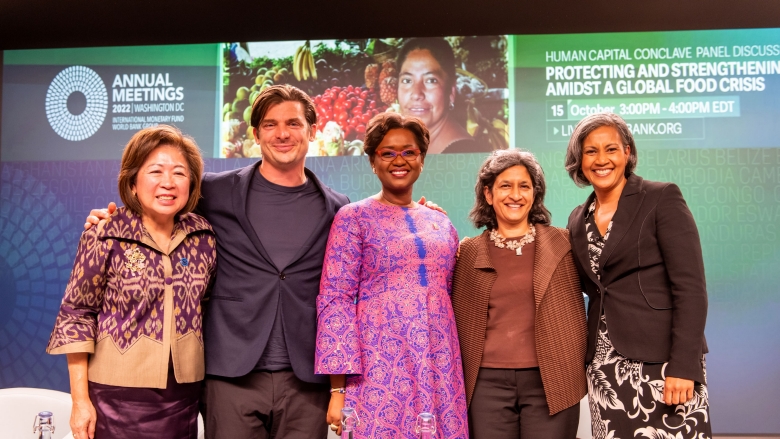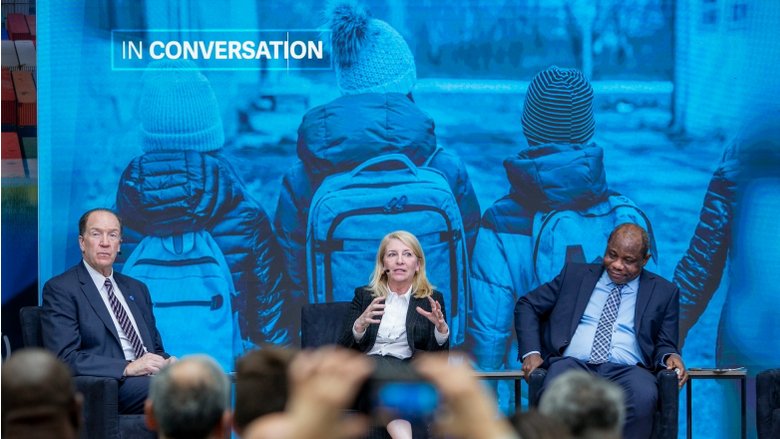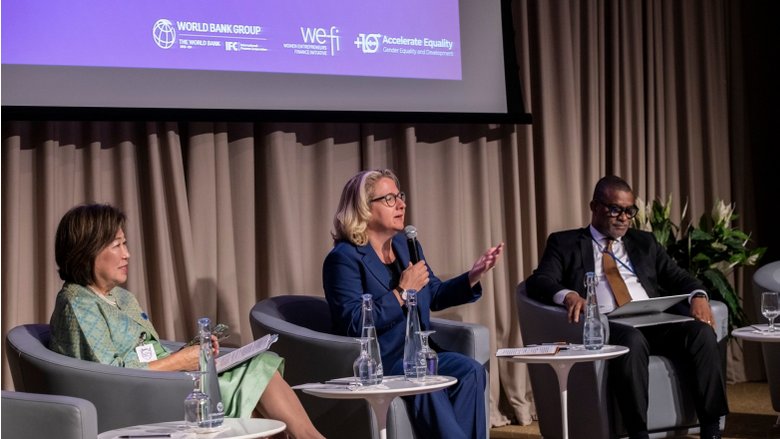October 18, 2022—Putting people at the heart of development was a major theme throughout the World Bank Group 2022 Annual Meetings. With decades of progress in human capital outcomes reversed by overlapping global crises, the urgency was palpable at three human development-focused events that highlighted these critical issues.
Flagship: Investing in Education for Our Children and Youth
The education and skills crisis exacerbated by COVID-19 were at the forefront of the Annual Meetings flagship event, “Investing in Education for Our Children and Youth,” featuring speakers from government, civil society, the private sector and UNICEF.
“We have an economic and moral imperative to improve education systems around the world. COVID has struck a hard blow and what we are trying to do is set the principles for funding getting people back in school, and for creating foundational learning experiences that can carry children forward into the future,” said World Bank President David Malpass who moderated a panel on recovering the learning losses caused by COVID-19. Simulations suggest that post-COVID, the rate of learning poverty could now be up to 70 percent in low- and middle-income countries.
Read more: What to Do about the Heavy Cost of COVID-19 on Children, Youth, and Future Productivity?
Learning in Crisis: Prioritizing education & effective policies to recover lost learning.
“The key to transforming education is political commitment,” said Catherine Russell, Executive Director, UNICEF. “Leaders have to make this is a priority. Because, if not, this learning crisis could become a learning catastrophe.”
Samuel D. Tweah Jr., Minister of Finance and Development Planning, Liberia, spoke about the challenge of investing in education amid other pressing development challenges. He said not doing so would come at a cost.
“Human capital is a serious challenge. It’s not just an education challenge, it’s an economic challenge. Because if we don’t invest adequately, we compromise the future,” Tweah said.
The losses are not limited to primary and secondary education.
In a second panel moderated by Mari Pangestu, panelists discussed the challenges of youth unemployment and the interruption of skills training during COVID. They also explored the opportunities presented by digital transformation, innovative partnerships and investment in skills development.
Augustine Mayabi described how the successful Kenya Youth Employment Opportunity Program he leads for the government of Kenya targets vulnerable youth: “That this group, even if they have no formal or informal education, can also receive skills and be employable—that’s lesson number one. We don’t have to condemn them.”
Panelists also emphasized the need to match the training and education opportunities to the job market, and the importance of targeting vulnerable youth and young women for more inclusive development.

Ministers of finance, budget and planning from over 40 countries discussed urgent policy priorities amid the current food crisis at the 2022 Human Capital Ministerial Conclave, the first in-person Conclave in three years. Hosted by the World Bank, the conclave is a closed door gathering of the Human Capital Project Network, a platform for countries to share innovations and leverage country experiences.
Ministers focused on the adverse impacts of the food crisis on the poor and on human capital outcomes. They emphasized the importance of social protection and investing in sustainable food and nutrition security to not only avert human capital setbacks, but to strengthen these critical outcomes for long-term growth and productivity.
Following the conclave, a public panel discussion delved deeper into the same themes.
KEY TAKEAWAYS:
|
The World Bank’s Mari Pangestu, Managing Director for Development Policy and Partnerships, and Mamta Murthi, Vice President for Human Development, were joined in discussion by Oulimata Sarr, Minister of Economy, Planning and Cooperation, Senegal and Josh Tetrick, Co-founder & CEO, Eat Just, Inc. The panel shared solutions on dealing with the food and nutrition crisis which has come on the heels of the pandemic, the war in Ukraine and the challenges of climate change.
Minister Sarr outlined her country’s commitment to social protection, including cash transfers and health coverage. She said investment is crucial for solutions. She shared how Senegal’s national school feeding initiative involves local farmers and uses indigenous plants to bring nutrition to children.
“We need to be realistic and innovative given the resource constraints countries are facing in dealing with multiple crises,” Pangestu said. She emphasized partnerships throughout the food system value chain for solutions and also highlighted the benefits of being both pragmatic and innovative when it comes to providing social protection during a crisis. “The World Bank stands ready to support countries with financing, data and knowledge,” she said.
Tetrick said the planet has no stable, secure food supply. His company, Eat Just, Inc., aims to change that by using technology to create products—including cell-based meat—that can feed people at scale.
“We feed more soy and corn to the animals we eat than to the people who are going to bed hungry tonight,” Tetrick said, calling for a “transformational redesign” of the global food system. “We need a food system that works for the planet and for us.”
“COVID-19 has been very unequal in its impact,” said Murthi in her closing remarks. “It’s the poor children, it’s the poor families that didn’t get access to health care, it’s the fact that people are struggling to get back into the job market. There’s a huge demand for more equality which has come out of COVID, and as the World Bank that’s something we have to take on board.”
Accelerating development and improving human capital outcomes through women’s empowerment was the theme of the “Empowering Women to Unleash Green, Resilient, and Inclusive Development: Should Development Policy Be Feminist?,” event co-hosted by the World Bank’s Gender Group and the Women Entrepreneurs Finance Initiative (We-Fi).
The event featured women entrepreneurs who benefited from We-Fi support. Saira Siddique, Founder & CEO of medIQ, a Pakistani smart healthcare startup, and Yetunde Adeyemi, Founder of Active Foods, a commercial bakery in Nigeria, shared their personal stories about starting and growing businesses amid overlapping challenges ranging from the Covid pandemic to rising supply chain costs. The two speakers emphasized the transformative role women entrepreneurs can play when they are empowered with financing, training and mentoring.
“When you empower a woman, you are empowering an entire nation,” Adeyemi said.
Two panel discussions followed on feminist development policies and rethinking the role of gender in development finance.
“A feminist development policy raises the bar beyond gender equality,” said Pangestu. Feminist policy entails embracing the equality and empowerment of all people, she continued and said that “it calls on us to be accountable for progress to leverage evidence and best practices and to work in partnership across sectors.”
Ernesto Max Elias Tonela, Minister of Economy and Finance, Mozambique, outlined his country’s progressive program of women’s empowerment policies, saying it was the right thing to do and important for economic growth.
“If we have to ask whether development policy should be feminist,” said Svenja Schulze, Federal Minister for Economic Cooperation and Development, Germany, “we still have a long way to go.” Women’s empowerment must be a guiding principle for development and politics, she said, because women can be agents of change.
Other panelists from the finance, government and CSO sectors agreed throughout their discussions that while the benefits of empowering women are clear, there is still much work to be done. They agreed that an important first step is to gather, analyze and leverage sex-disaggregated data to design policies that support women.
Mamta Murthi closed the event on the same note, recognizing the importance of policy frameworks and changing structural issues, while also emphasizing the importance of data and partnerships.
“We have to change mindsets and norms and that comes from each and every action we can engage in. We need a massive partnership, and we can all play a role. I encourage you to be a part of these partnerships, because we are at such a critical juncture for gender equality,” Murthi said.


